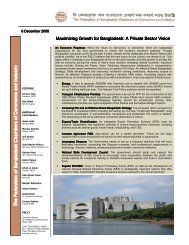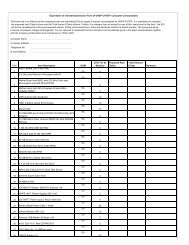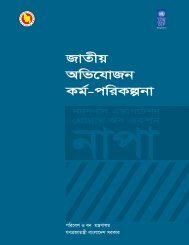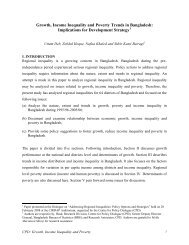Framework for a Strategy of UP Revenue/Resource Mobilisation ...
Framework for a Strategy of UP Revenue/Resource Mobilisation ...
Framework for a Strategy of UP Revenue/Resource Mobilisation ...
Create successful ePaper yourself
Turn your PDF publications into a flip-book with our unique Google optimized e-Paper software.
probably be paid more than the 15% commission. It might also reduce the motivation to collect.<br />
Thus, it is recommended that <strong>UP</strong>s continue to employ collectors on commission, but review<br />
how the incentives can be augmented.<br />
i) Spot checks by the <strong>UP</strong> Chairman or Secretary to see whether there is fraud by collectors (e.g.<br />
not giving a receipt or giving a fake receipt). For example, selective follow-up visits to the<br />
houses visited by collectors would reveal any fraud if households say that they have paid but do<br />
not have a proper receipt. Rotating collectors between wards part way through the year could<br />
have the same effect, but that would only be possible if there were several collectors.<br />
j) Prompt follow-up action where people have not paid. Households should be visited at least one<br />
a month <strong>for</strong> the first three months <strong>of</strong> the financial year until they have paid what is due.<br />
k) After three months (i.e. end <strong>of</strong> September), compiling and displaying a list <strong>of</strong> defaulters (e.g. on<br />
the <strong>UP</strong> notice board and/or in other public places), or putting notices on the houses or<br />
defaulters; this should have the effect <strong>of</strong> shaming non-payers into paying. It would also help to<br />
reveal any fraud by collectors or collusion between households and collectors.<br />
l) Motivating people to pay through public in<strong>for</strong>mation campaigns at ward and <strong>UP</strong> level,<br />
explaining how developments already completed under LGSP-LIC and other programmes are<br />
threatened by people not paying their tax. Such meetings may carry more weight if supported by<br />
the UNO, so the <strong>UP</strong> Chairman should solicit the help <strong>of</strong> the UNO. People’s willingness to pay<br />
can also be increased through opportunities to participate in decisions about how resources are<br />
to be used (e.g. budget prioritisation meetings), and where there is confidence that the taxes<br />
collected are used properly, through increased transparency about resource use.<br />
m) As a last resort, taking en<strong>for</strong>cement action against those who can af<strong>for</strong>d to pay but who refuse to<br />
pay. Initially this may take the <strong>for</strong>m <strong>of</strong> a letter from the <strong>UP</strong> Chairman to give the signal that it<br />
sends to other people is that the <strong>UP</strong> is serious about collecting tax. Hopefully, that will induce<br />
other defaulters to pay up.<br />
n) In the case <strong>of</strong> business tax / licences, the <strong>UP</strong> should prepare a comprehensive list <strong>of</strong> all<br />
businesses in the <strong>UP</strong>. This will require field inspection, and can be cross-checked against the<br />
holding tax register <strong>for</strong> non-domestic properties (ideally, using the same plot number and/or<br />
taxpayer identification number in both registers to facilitate cross-checking). The type <strong>of</strong><br />
business should be recorded, together with the size category (consistent with the classifications<br />
in the suggested Model Tax Schedule – Table 2), and the amount payable. All business,<br />
commercial and pr<strong>of</strong>essional activities that are covered by the Model Tax Schedule should be<br />
listed, including NGOs.<br />
16










